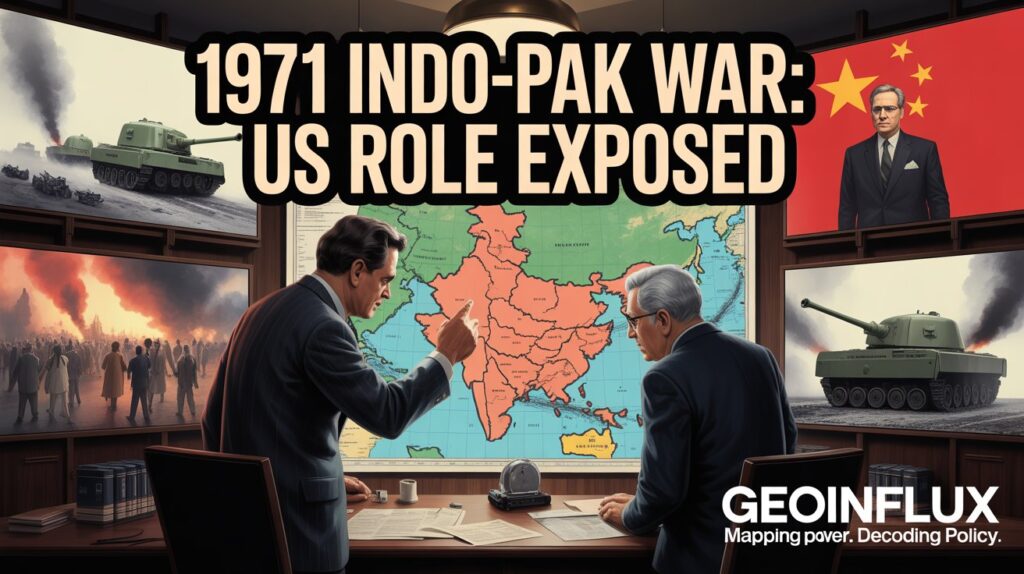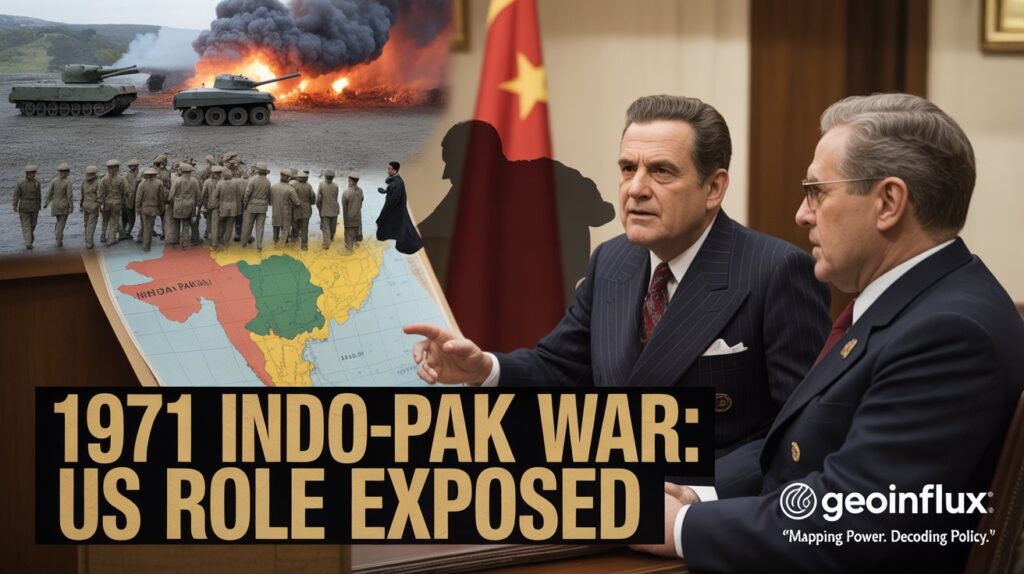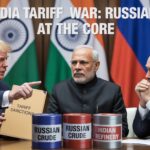1971 Indo-Pak War US Role: The Indian Army’s tweet recalling U.S. arms to Pakistan during the 1971 Indo-Pak War highlights the historic US role. Uncover 7 shocking revelations—from Nixon’s controversial backing to India’s strategic response—revealing how Cold War politics still shape South Asia today.
📌 1971 Indo-Pak War US Role: A Shocking Flashback
In a bold and symbolic gesture, the Indian Army’s Eastern Command recently shared a decades-old newspaper clipping dating back to the 1971 Indo-Pak War, referencing massive U.S. military aid to Pakistan.
This tweet, under the innocuous-sounding tag of “#ThrowbackTuesday,” has quickly drawn geopolitical attention.
It comes at a time when India–US relations are strained over issues like trade tariffs and India’s continued purchase of Russian oil.
This calculated throwback serves not only as a reminder of the 1971 Indo-Pak War US role, but also as a diplomatic warning: India does not forget strategic betrayals.
📰 The Indian Army’s Eastern Command Throwback Tweet: An Old Clipping, A New Message
The post included a 1971 newspaper clipping with a headline declaring:
“US Arms Worth $2 Billion Shipped to Pakistan Since 1954”
The Indian Army’s timing was no coincidence. The world is watching India’s non-aligned posture amid the Russia–Ukraine conflict and the resulting Western pressure.
The Army’s post adds historical weight to India’s current stance by resurfacing evidence of the US role in the 1971 Indo-Pak War, when Washington favoured Pakistan, despite credible reports of genocide in East Pakistan (now Bangladesh).
The message was clear: “Don’t question our strategic choices when your own record is stained.”
🔙 The Historical Backdrop: The 1971 Indo-Pak War US Role
The 1971 Indo-Pak War US role remains a major flashpoint in India’s diplomatic memory. During the 17 years leading up to the war, the United States had supplied Pakistan with an arsenal that included:

- F-86 Sabre jets
- Patton tanks
- Anti-aircraft artillery
- Advanced radar systems
- Military training and logistics
- Small arms and ammunition
This military support was rooted in Cold War geopolitics. Pakistan had joined SEATO and CENTO, aligning itself with Western powers.
In return, the U.S. treated Pakistan as a critical regional ally, ignoring its simmering tensions with India.
💣 1971 Indo-Pak War US Role: How Nixon and Kissinger Backed Genocide
The most controversial phase of the 1971 Indo-Pak War US role began when Pakistan’s army, under General Yahya Khan, launched Operation Searchlight — a brutal crackdown on Bengali civilians in East Pakistan.
What followed was a genocide, documented extensively by U.S. diplomats like Archer Blood, whose warnings were ignored.
Sure, here’s a simplified version of that sentence:
Instead of stopping or speaking out against the violence, U.S. President Richard Nixon and his advisor Henry Kissinger continued to support Pakistan.
Also Read
Their reason wasn’t loyalty to Pakistan, but because its leader, Yahya Khan, was secretly helping the U.S. communicate with China.
Key US Actions During the 1971 War:
- Dispatched USS Enterprise to the Bay of Bengal in an implied threat to India
- Provided diplomatic cover for Pakistan at the United Nations
- Routed military aid through Iran, Jordan, and Turkey to maintain plausible deniability
- Ignored detailed diplomatic cables exposing the genocide
- Supplied Pakistan with over $3.6 billion in military and economic aid
This role has defined the 1971 Indo-Pak War US role in Indian historical consciousness as one of betrayal masked as diplomacy.
🔍 Strategic Relevance 1971 Indo-Pak War US role in 2025
The resurfacing of this 1971 episode is not just for academic purposes. It carries tactical relevance in today’s context.
The Indian Army’s diplomatic message implicitly questions U.S. moral authority as Washington criticises India’s neutrality in the Ukraine conflict and its India–Russia oil purchases.
What the 1971 War Teaches India Today:
- Alliances shift based on interest, not values
- Western democracies often act pragmatically, not ethically
- Self-reliant strategic postures are non-negotiable
India’s refusal to bend under U.S. pressure today echoes its resilience during the 1971 war, even when threatened by American naval intervention.
🛢️ India’s Strategic Choices: Oil, Arms, and Autonomy
Today, India continues to buy discounted Russian oil, citing national interest and energy security. While US trade tariffs on India and diplomatic pressure mount, New Delhi remains unmoved.
The 1971 Indo-Pak War US role strengthens India’s current narrative: “When we were bleeding, you chose your interests. We’ll do the same.”
India’s multi-alignment strategy includes:
- Purchasing Russian S-400 missile systems
- Strengthening the Chabahar Port in Iran
- Remaining an active member of BRICS and SCO
- Engaging in the QUAD with the U.S., Japan, and Australia — but on its terms
📣 The Power of Historical Memory in Foreign Policy
India is no longer merely reacting to criticism — it’s using history as a geopolitical tool. The Indian Army’s tweet is a soft power tactic, intended to:
- Remind global partners of India’s strategic memory
- Push back against Western double standards
- Reinforce national confidence in strategic diplomacy India
The 1971 Indo-Pak War US role isn’t just a historical chapter; it’s a live component of India’s international messaging.
🧭 Conclusion: Yesterday’s Betrayal, Today’s Resolve
Here is a plain English version of that passage:
The Indian Army’s message is clear: India won’t accept lectures on democracy from countries that failed to do the right thing in 1971.
By reminding the world of the U.S. role in the 1971 Indo-Pak War, India is saying that its independence in making decisions comes from hard lessons in history — and it won’t give that up.
As the world reshapes into a new multipolar order, India is asserting not just its interests but its memory.
📊 Summary Recap Table
| Aspect | Key Takeaway |
|---|---|
| Indian Army tweet | Highlighted U.S. arms support to Pakistan before and during 1971 War |
| Highlighted U.S. arms support to Pakistan before and during the 1971 War | Chose geopolitics over genocide prevention, supported Pakistan |
| Modern context | Diplomatic reply to U.S. criticism on India’s trade with Russia |
| Strategic impact | Strengthens India’s argument for sovereign choices in global alliances |
| Domestic effect | Boosts national confidence and reminds public of past Western hypocrisy |
❓FAQs
What was the 1971 Indo-Pak War US role?
The U.S. supported Pakistan militarily and diplomatically, even during the genocide in East Pakistan, to maintain strategic ties with China.
Why is India recalling the 1971 war now?
To counter U.S. criticism of India’s foreign policy and to remind the world of historical double standards in India–US relations.
How does this impact current India–US relations?
It adds a layer of historical mistrust and reinforces India’s resolve to make independent foreign policy decisions.
What is the Indian Army’s diplomatic message?
That India remembers its history and won’t be dictated to by powers that once sided against its moral and strategic interests.
Is this post part of a larger Indian strategy?
Yes. It reflects India’s broader push for strategic diplomacy based on sovereignty, not alignment.
🔗 Related GeoInflux Articles
- Air India Flight 171 Tragedy: Shocking British Media Blame, Boeing Concerns & the Fight for Truth
- India vs NATO: 5 Bold Moves That Expose the West’s Double Standards and Spark RIC Revival
- India Russia Ties Under Fire: Why Western Media Now Labels India an ‘Enemy’
- Doval & Jaishankar in Russia: A Multipolar Message
📚 References
- U.S. Department of State – Foreign Relations of the United States, 1969–1976, Volume XI, South Asia Crisis, 1971
https://history.state.gov/historicaldocuments/frus1969-76v11
(Official U.S. record of communications during the 1971 crisis, including Nixon and Kissinger’s conversations.) - Gary J. Bass – The Blood Telegram: Nixon, Kissinger, and a Forgotten Genocide
https://www.amazon.in/Blood-Telegram-Kissinger-Forgotten-Genocide/dp/0307947201
(Pulitzer-finalist book revealing how U.S. leadership supported Pakistan during the Bangladesh genocide.) - BBC News – “How Nixon backed Pakistan during Bangladesh’s war of independence”
https://www.bbc.com/news/world-asia-60620410
(A concise summary of Nixon’s role and strategic motivations in 1971.) - Indian Army (@adgpi) – Official Twitter/X Post (2025)
https://twitter.com/adgpi
(The Indian Army tweet invoking the 1971 war and U.S. involvement, tied to ongoing diplomatic tensions.) - Al Jazeera – “Why India is invoking 1971 to counter US pressure”
https://www.aljazeera.com/news/2025/08/03/why-india-invokes-1971-to-counter-us-pressure
(Recent geopolitical analysis on how India uses historical context in current diplomacy.) - The Wire – “India’s Memory of 1971: A Diplomatic Signal to the West”
https://thewire.in/diplomacy/india-1971-war-us-foreign-policy
(Explores India’s use of historical memory to assert strategic autonomy in present-day foreign policy.) - Council on Foreign Relations – “India’s Foreign Policy in a Multipolar World”
https://www.cfr.org
(A broader look at how India navigates great power competition, including U.S. and Russia.) - Washington Post – Declassified Nixon Tapes Reveal U.S. Strategy During South Asia War
https://www.washingtonpost.com/archive/politics/2005/12/05
(Insights from White House tapes showing internal U.S. views on the 1971 war.)
🙏 Thank You for Reading
Thank you for taking the time to read our in-depth analysis on the 1971 Indo-Pak War and the United States’ controversial role. At GeoInflux, we strive to uncover the untold layers of global power dynamics, backed by history, strategy, and truth.
If you found this article insightful, do share it and explore more such content on GeoInflux.com — where geopolitics meets clarity.
Stay informed. Stay ahead. 🌍





Pingback: US-India Tariff War 2025 Erupts: Trump Slams Indian Oil Imports, Ignores China – 7 Explosive Takeaways | A GeoInflux Analysis - GeoInflux
Pingback: India US Trade War Trump Tariffs Surge to 50% in 2025 – Strategic Fallout | GeoInflux Analysis - GeoInflux
There is obviously a lot to identify about this. I assume you made various nice points in features also.
WONDERFUL Post.thanks for share..more wait .. …